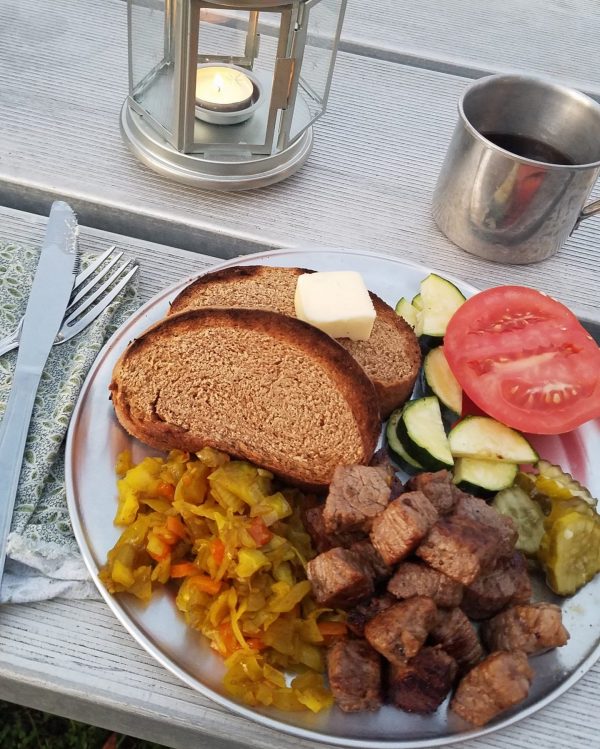Civil War Cooking: Officers’ Mess Breakfast with the 61st New York
After the Army of the Potomac fell back from the gates of Richmond during the Peninsula Campaign of 1862, it settled around Harrison Landing on the James River. Here, the soldiers and officers in blue waited through the blazing summer heat.
Colonel Francis C. Barlow, commanding the 61st New York Infantry Regiment, chronicled his typical day and food menu in a letter to his mother and brother on August 9, 1862.
My dear Mother makes certain enquiries which I now proceed to answer. My course of life is as follows. I get up to Reveille at 4:30 a.m. + generally take a nap before breakfast which is about 6 a.m. We have for breakfast tea or coffee, toasted bread, butter (melted like oil when we have no ice) steak, chow chow, pickles + vegetables when we can get them. About 7 a.m. we get the mail + then I answer letters. I have a great many from the relatives of the men enquiring about them. I have also various orders to make + Regimental business to attend to which I do at this time + which takes me an hour or two. After this I take off everything but my shirt + drawers + socks + lie down + finish reading the papers which came the night before. Sometimes I play a game of poker at this hour with my friend Miles. [Nelson Miles] Between 10 + 11 I generally ride down to see A. [Arabella, his wife] which is about 5 minutes ride. I come back between 12 + 1 + then we have dinner which is very much like breakfast except that we some time get a bottle of ale. I have got a good oven fixed up + bake fresh bread daily for the Regt. + we also have it for ourselves. After dinner I read sleep or play poker until 6 p.m. which there is a Company + Regimental drill which I attend. In the evening I generally go down to the Hospital + see A. I often go there to tea about 7 p.m. The N.Y. papers of the day before came. We always get the Herald, sometimes the Times + rarely the Tribune. This is our life one day after another. Very rarely I take a ride to some other Camp or out to the front. We are pretty well off on the food question.
This summer I shared the letter with a friend in a recorded video chat and made some aside comment “what on earth is chow chow?” She messaged back a little later and promptly informed me that I was a Yankee since it’s a traditional southern relish. I asked her to describe it and apparently there are no words to describe it properly. Curious, I headed for Pinterest and dug up a “traditional” southern chow chow recipe. And at that moment, this cooking project was born. It would be one thing to make chow chow, but how did its flavor compliment the other foods on Barlow’s plate? I just had to make it all to find out.
The chow chow I created had cabbage, onion, bell pepper, green tomato, and a bunch of “secret” spices boiled in vinegar and accented with white sugar. I thought it smelled terrible while cooking, but determined to carry on and keep an open mind.
Later that evening, I put the plate together…and even remembered to toast the bread!
I liked the chow chow, especially with the beef and fresh vegetables. However, I’m not a big fan of sweet pickle flavor so when I make it again, I will be reducing the sugar and going for a more vinegary and seasonings flavor.
The meal is hearty and one of the best balanced menus that I’ve found and cooked—probably due to the fact that the regiment was stationary and had access to fresh foods and shipped supplies. I took this meal outside and sat a picnic table with my unauthentic lantern casting a slow light in the twilight evening. It just added something extra.
This taste of history is one of my favorites in the whole cooking experiment, and it proves that Yankees can appreciate Southern chow chow. From New York in 1862…or California in 2020.
Source:
Barlow, Francis C. edited by Christian G. Samito. “Fear Was Not In Him”: The Civil War Letters of Major General Francis C. Barlow. Fordham University Press, 2004. Pages 105-106.


Great article! The chow chow photo looks amazingly like some of the junkyard omelettes I throw together on Saturday morning! And I had always thought that the phrase “civil war cooking” was an oxymoron ?
I better turn in my Southern card. I’ve never heard of chow chow, but it sounds like quite a mix of things. I wonder if it’s a predecessor of some other dish, or modified from others like sauerkraut or coleslaw. Anyway, a rather nicely rounded meal there.
Does this mean a Civil War cookbook is in the future of ECWS?
This has to happen!! Chris, make it so!
Barlow was known to strip down to his underdrawers during the hot summer months in Virginia. Theodore Lyman commented on it during the Overland Campaign. They were friends and attended Harvard together (same class).